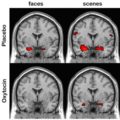
Lending more weight to the theory thatdepression is linked to an inflammatory response in the brain, Vanderbilt University scientists have triggered the immune systems of mice to produce “despair-like” behavior that has similarities to depression in humans. Their study, in Neuropsychopharmacology, suggests that depression may be triggered by the same mechanisms that enable the immune system to respond to infection.
“Many people exhibit signs of lethargy and depressed mood during flu-like illnesses,” said Vanderbilt neuroscientist Randy Blakely. “Generally these have been treated as just a consequence of being physically ill, but we think there is likely to be something more brain-centric at work here.”
Blakely and his colleagues previously reported that inflammatory cytokines can enhance the activity of the serotonin transporter (SERT), which regulates the supply of the neurotransmitter serotonin in the synapse, or gap between nerve cells. Elevations in SERT activity remove serotonin from brain synapses at an enhanced rate and, based on studies in animal models and man, would be predicted to increase the risk for mood and anxiety disorders. Indeed, a class of antidepressant drugs called selective serotonin reuptake inhibitors (SSRIs – Prozac, Zoloft) work by blocking the ability of SERT to eliminate serotonin.
In Blakely’s study with mice, the researchers triggered pro-inflammatory cytokine production. Within 30 to 60 minutes, SERT was activated in the brain and the animals displayed despair-like behavior. Remarkably, this behavior was not observed when cytokine production was triggered in mice lacking the SERT gene. Similarly, a drug that blocks inflammatory molecule signaling also prevented stimulation of SERT and the despair behavior. “It’s as if these inflammatory molecules are an ‘anti-Prozac,'” Blakely remarked.
The study notes that identifying genetic variations in the SERT activation pathway might suggest additional sources of genetic risk for depression. “Our work suggests that novel therapies targeting inflammation-linked pathways may be of use in the treatment of mood disorders,” Blakely concluded.
Related:
Meditation as effective as antidepressants
Hygiene Hypothesis linked to depression
A biomarker for suicidal tendencies?








Comments are closed.